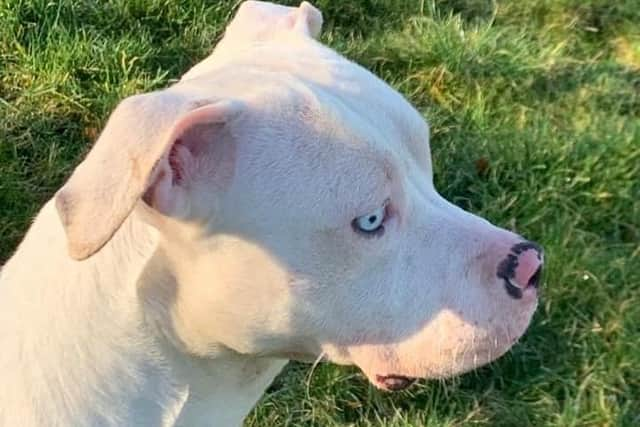Pendle Dogs: Animal sanctuary overwhelmed by abandoned pets fears 'heart-breaking' puppy breeding trade could be more lucrative than drug dealing
and live on Freeview channel 276
Paula Knowles, manager of Pendle Dogs, says pet owners are dumping large breeds with training issues, such as the American XL Bully, in droves.
The charity is the busiest it has ever been in its 10-year history - it has no space for unwanted pets and can only rehome dogs in emergencies. It is now calling for harsher laws to shut down shady traders.
Advertisement
Hide AdAdvertisement
Hide AdPaula, who founded the charity with Sharon Ashley, said: “I've never seen anything like this in 10 years. We have non-stop calls asking us to rehome dogs. This situation is dire.


"Last year, we had three or four requests to rehome pets a week. We had six this morning and 66 in a week last fortnight.
"The whole UK rescue system is horrendous. We network countrywide, and there is no space in the UK. It’s heart-breaking.
“We have to save space for last-chance dogs who will die if we don't bring them in.
Advertisement
Hide AdAdvertisement
Hide Ad"The biggest problem is excessive breeding. Everyone seemed to be breeding dogs during and in the year after the lockdown. Prices for puppies tripled. I heard someone say there is now more money in dogs than drugs."


The charity, which turns 10 next month, took in around 100 dogs last year. By this January, it had rescued nearly a quarter of that total and about 43 this year.
It reflects the national picture: calls to the RSPCA about deserted animals rise yearly by 25%, with the charity believing it could be down to the cost of living crisis. In January alone, RSPCA officers dealt with more than 1,500 incidents of abandonment.
The American XL Bully, a "big and powerful" modern dog, was highly sought after in 2020, according to Paula, with illicit traders selling it online for around £2,000 per puppy.


Advertisement
Hide AdAdvertisement
Hide Ad"We started seeing the new breed everywhere in 2020. It always pulls on the lead. That’s how owners want them to act."
The puppies are unsocialised when they leave their mum and Pendle Dogs regularly receive phone calls from owners struggling to cope with their Bully's aggressive behaviour as it ages.
“Many people don’t understand them. XL Bullies need structure and a lot of exercise. They need to be raised right, and they need homes we can work alongside."
Paula added: “XL Bullies are now going out of fashion. The breed is not worth anything to anyone anymore. We’ve had to refuse five today. We can’t rehome them because nobody wants them. It’s worrying that they are being passed from one home to another."
Advertisement
Hide AdAdvertisement
Hide AdCiting other fashionable large breeds, she described a phone call from someone who bought a German Shephard online to guard their house. The owner, who misunderstood their pet’s barking as aggression, did not dare enter their home.
As a result of behavioural issues like this, many dogs live outside in their owner's yard or garden.
“We call them the garden dogs because they have never been on a lead and don’t know how to act. They are amazed by everything.
"The other week, a girl in Colne contacted us. Her dog lives in the garden because it started jumping on the table at six-months-old."
Advertisement
Hide AdAdvertisement
Hide AdPaula fears that dog attacks will increase due to a lack of socialisation.
“I’m dreading this summer when people come out with dogs with no training. I think every dog owner is scared to walk their dog."
British law aims to crack down on underground criminal puppy farms where dogs are mass-produced. Breeders must legally have a license if they breed three or more litters of puppies for sale in 12 months and/or advertise a business of selling dogs.
Third-party sales are illegal under Lucy’s Law: people can only buy dogs from the breeder or a reputable sanctuary.
Advertisement
Hide AdAdvertisement
Hide AdAnother problem with unscrupulous breeders and puppy mills is that dogs suffer neglect, lasting trauma, and genetic deformities.
“So many dogs have come to us with fleas," said Paula.
"Some are from a Blackburn breeder. She’s breeding small dogs, but they have hip issues and have had to have amputations. We can’t stop her.
“People are breeding dogs for looks and colours like lilac, but many are deformed. It shouldn’t be allowed. It’s crazy.
"I know a lot of Bulldogs with joint and hip problems have been put to sleep in other rescues because they have breathing problems and can hardly walk as they can’t hold their body weight."
Advertisement
Hide AdAdvertisement
Hide AdPuppies - including those with cropped ears - are also imported from other countries to satisfy the public's desire for new pets.
"They crop their ears to make them look tougher. It’s illegal in this country. They say they come from another country, but when you do a ship search, you see they were bred here," said Paula.
It is why the RSPCA urges the Government to raise the age of imported dogs to keep puppies with breeders longer and reduce sales as they lose their "cute factor".
As Paula added, further regulation "is the only thing that will stop this tsunami of dogs."
Advertisement
Hide AdAdvertisement
Hide AdPendle Dogs offers free training and pet food to people struggling to care for their animals – contact [email protected] for support. Alternatively, call the RSPCA on 0300 123 0650 from Monday to Friday, 9am to 5pm, for cost of living advice.
